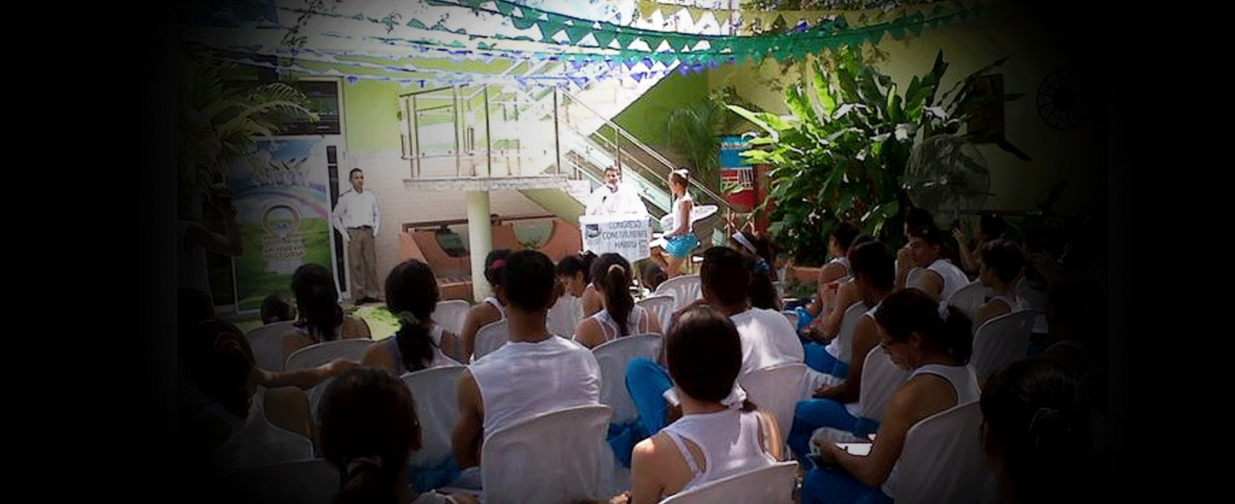
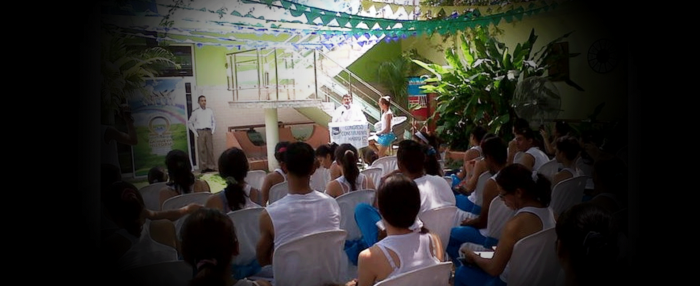
Leonel González built his own utopia of primitive communism on a plot of land in the municipality of San Francisco in Maracaibo, grouped around a singular vision of the Adventist creed. There nothing belongs to anyone and at the same time belongs to everyone. With funds from the government and his collectivist organization, he scored several successes in the cooperative management that, however, won him the hostility of the mayoralty and prosecutor's office, both chavistas, which do not lose the opportunity to harass him with constant accusations of sexual abuse and even tax fraud to which the strange behavior of 'The Prophet' gives grounds.
|
Getting your Trinity Audio player ready...
|
In the Habirú community there are 35 bathrooms and a giant septic tank. On top of this, on a polished rustic ceramic-finished floor, 63 adults and 17 children practice dance therapy every Sunday. Participating in the activity is an obligation, just as it is to respect the norms of not smoking, not drinking, not touching the grass and giving all the reward of daily work to an ark of collective benefit. Nobody has a single Bolivar in their pocket, but everyone has access to private education, swimming courses, game rooms, playgrounds, common spaces, computer centers, work according to their occupation and a long and repetitive class of Bible studies according to the Seventh-day Adventist current, which wakes up every Saturday with typical banquets, cheap clothes and much, much hubbub. The purpose is to thank God and Leonel, the Prophet, for all that. It's like a third-world kibbutz living the community dream that proclaims the so-called Socialism of the 21st century.
The La Cruz sector owes its name to a sad square without lights that its inhabitants built years ago so that the area has a reference point. And that's all it's good for: its neighbors don't walk around and it doesn't have street lighting either. It is nestled between three sandy streets and the main avenue of El Bajo, the southernmost parish of the municipality of San Francisco, in Maracaibo (capital of Zulia state, northwestern Venezuela). Traditionally, it is a transit point for shrimp farm owners and its residents make a living within it by peeling shrimp for an almost miserable salary. There are also oil tankers and headquarters of state-owned companies. Poverty and opulence contrast among its abandoned landscapes.
In one of those dusty streets there is a humble house of colonial marabine architecture with the walls corroded by saltpeter that comes from the neighboring Lago de Maracaibo (Maracaibo Lake). Leonel González was raised there with his six siblings and grew up between the boredom and the studies of teaching. One day, on August 17, 1985, motivated by a great curiosity, he arrived at the Seventh-day Adventist temple in the Sierra Maestra sector, several kilometers from where he lives. He sought acceptance in the social group and to know the word of God. He was 17 years old and could hardly dance or socialize in neighborhood celebrations. That his life resembles that of a figure in contemporary national history is purely coincidental, he says, sitting on a metal armchair and surrounded by his three most loyal followers.
- I realized that the church was lacking something, I wanted to take on the role of reformer that the church needed. To wake it up from that lethargy. That was when they disfellowshipped me the first time. I was 18 years old.
Leonel was married for almost 30 years (widowed since 2014) and has two daughters. In 2011, the press reported that he had been caught in 1985 kissing a man in the facilities of one of the 35 Adventist temples in the country. That statement was accompanied by accusations of rape of children and teenagers.
- You don't masturbate? - Leonel laughs with his eyes and lips. It builds trust. - I masturbate too. The Adventist church forbids masturbation, and I, at age 18, invited a partner to masturbate together, and that's what triggered my first expulsion.
To Leonel, being disfellowshipped meant nothing. He was then obsessed with the idea of ??reforming his temple and showing the followers that the Adventist, far from being a religion based on the practice of the common good, became the same problem of every faith: devotion and flattery to a supreme being called God. So he stayed and then he was accepted.
The conversation lasted for more than an hour for him to explain the reasons behind his beginnings, before founding Habirú, but his conclusion was that the religious current he followed did not practice what he professed. It didn't even have a prophet, who is a figure of counsel that every congregation of believers should have.
Another August 17, but in 2002, he was expelled from the temple again. This time all the religious bureaucracy of the state of Zulia met to end this annoyance that was dragging more and more people. That day 53 followers were disfellowshipped. Back then Leonel already used to urge his concentrated listeners to put aside the praises of Jesus and begin to practice what he asked: to live in community for the common good.
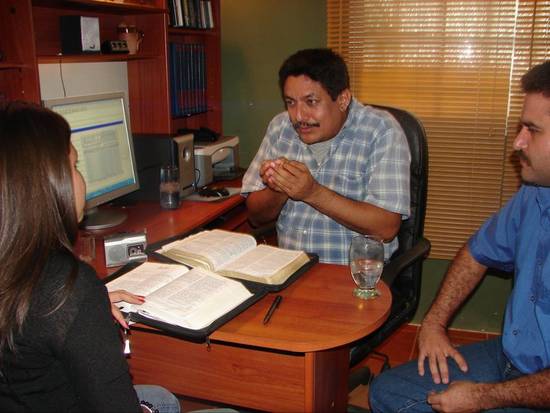
When he was kicked out of the church again, Leonel was already married and living in a small house he had built on the same plot of land where he was born. It is a space the size of a block with access to two parallel streets. Instead of being discouraged, he took the other 52 expelled members to his home and invited them to congregate every week to found a new church that would truly practice the commandments of the son of God. So they built the first hall and three years later they started living together. All 53 of them.
In Hebrew, Habirú means "the one who crosses". The scriptures claim that they were once nomads; sometime they're pictured as mercenaries, sometime slaves and some time rebels. Leonel is certain that the Habirú were a Babylonian caste dominated by Mesopotamia and condemned since then to prejudice. By living together as a community, the 53 crossed the established norms of modern society, and also rebelled against the prohibitions and practices of the Adventist church. They all called themselves Habirú. By that time, Venezuela was already talking about socialism and a communal state whose leader, Hugo Chávez, dreamed of satellite cities and community self-management. It was 2005.
It would be 1.00 in the afternoon, no less. Leonel left the principal's office of the Guillermo Miller School and went home for lunch when he someone knocked the door. In El Bajo the breeze is strong due to its proximity to the beach, and at that time the children had just left school. When Leonel peeped out, he saw two women. One of them, he says, looked more like a man than a woman, and the other, a gangling officer of the "Consejo de Protección del Niño y el Adolescente" (Council for the Protection of Children and Adolescents). They did not carry a search warrant, but they did carry badges that identified them as members of the "Cuerpo de Investigaciones Científicas, Penales y Criminalísticas" (Scientific, Penal and Criminal Investigation Corps) (CICPC, the auxiliary police of the Prosecutor's Office in Venezuela). His wife, Yaneth, didn't know what to expect, she had already dealt with a lot, so she opened the door and the ladies entered the residence. One look at the rooms, another one at the corridors, they took some notes. A scream from the asexual official, then a louder scream: a threat.
The children's rights worker told Leonel that the school he ran was illegal, but that March 16, 2011 he had updated the documents. They took a mobile phone from him and inspected the entire school. The procedure took about an hour, and ended when a scientific police inspector named Luis Noguera acknowledged that there was no reason to arrest him, but suggested that he go to the police delegation in the jurisdiction to find out what the complaint on him was about.
Leonel, who doesn't know how to drive, asked one of his followers to drive the car and Yuvani, his faithful companion, to follow him to the police office. The Prophet didn't know what to think and devoted himself to look at the route between his house and the old cross: a truck that had just arrived with a group of students, the gathering of some neighbors supporting him and a dozen (or more, he doesn't remember how many) of patrols of the San Francisco municipal Police. Leonel wondered what was happening before letting out a nervous laugh.
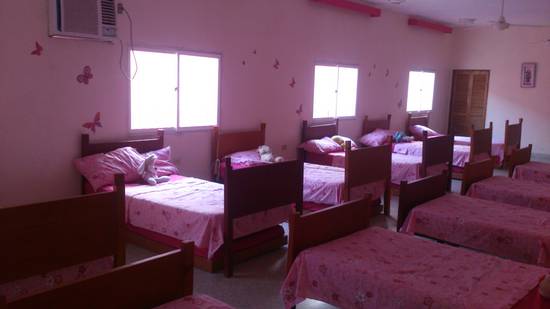
Already constituted as a community based on the Christian scriptures, the Habirú participated in the "Misión Vuelvan Caras", a program of the government of Hugo Chávez that provided advice to Venezuelans to organize cooperatives. From there they received financing and founded a bakery for distribution, that is, they prepare products and sell them to the merchants. In this way they expanded the house and bought two more properties in nearby neighborhoods. Each member of the cooperative had to perform a function and all the money collected was taken to an ark to administer it equitably towards meeting basic services and other needs. Then the practice grew and the Habirú developed other domestic activities, because they all lived together.
Already with contacts in the government, the members of the cooperative were in charge of preparing lunches for every assembly and political act that took place in the south of Maracaibo. In only five years, its members already had a residence (on the plot of land of Leonel's parents), two bakeries, a sedan-type car, a distribution truck, a refrigerated truck, a private school and a popular market that sells food to the inhabitants of La Cruz at solidarity prices.
The Guillermo Miller School is located right in Leonel's house and on the popular market. The 17 children who live in the commune study there and their mothers are the teachers. At the same time, around 180 children from the community receive classes in this private institution, with classrooms for only 12 students each and equipped with books, computers and air conditioning. Their parents, most of them shrimp workers, pay 200 bolivars per month, which is the same as one dollar at the black market exchange rate.
The famous efficiency of the Habirú caused the neighbors to invite them to participate in the elections of the communal councils, so Leonel became one of its members along with Yuvani. Among his projects was to build a school for children with special needs that would benefit 30 sectors of that parish.
His dealings with the public administration provided him with funds but also with enemies. Communal councils members, upon receiving the funds from the Government, must seek contractor companies to execute them. They already had several thousand bolivars in their hands when the parish leaders of the government's "Partido Socialista Unido de Venezuela (PSUV)" (United Socialist Party of Venezuela) recommended several acquaintances.
- Unknown people called me saying that their company could do the work, but we refused, and since I had to sign the checks, nothing was ever approved for anyone.
The new school's name is Desiderio Vílchez and it was the only work delivered by any communal council in San Francisco. Although the project established that it was a simple structure, they installed a playground and air conditioners. Part of the secret was that the workforce was from Habirú itself, since they are responsible for all the planning, architecture and construction of absolutely everything. They don't pay for any service and the costs go down.
- We showed that the work could be done with the budget they delivered - tells Leonel.
Thus anybody can gain enemies.
- I don't know whose phone they took from me, but yes, it had a pornographic video - He has a not so dense moustache and wears a black plastic strap watch and a blue shirt with short sleeves. His facial features denote he has some indigenous ancestor.
Armando Guillén is a commissary over 50 years old, almost two meters tall, with a deep voice and a big mustache. He directed the Scientific Police subdelegation of San Francisco - a municipality in the south of the metropolitan area of Maracaibo - from 2010 to 2012. Despite his accomplishments, the local media criticized his close ties with PSUV Mayor Omar Prieto. He was accused of receiving direct orders from the mayor, without obeying any other hierarchy.
That day Leonel arrived at the old police offices and took him directly to Guillén's office, located on the first floor (only a few offices on the ground floor, and in a corridor, the bathrooms right next to the cells). He then felt some peace of mind, but before meeting with the commissioner, he saw Raúl Díaz Granados leave the office, the boyfriend of his wife's sister, who had left Habirú months before, despising the entire environment. They looked each other in the eye, but did not speak a word to each other.
Upon entering, the commissioner clarified the doubts: the complaint was made by Raúl, about some irregularities in his community. Either way, it wouldn't get any bigger, he thought, but he was still surprised by all the police deployment for a complaint that would be nothing more than a gossip.
- When the conversation with the commissioner ended, I felt like going to the bathroom.
Leonel González was in prison for six months.
Cruel labor, forced labor, sexual violence on a continuum basis, profit for non-indicated work, profit for child work, exhibition of pornographic material and reduction to slavery. These were the crimes which Leonel was accused of committing, along with Yuvani and both's driver. The next day he entered the "Bunker” of the "El Marite" prison and then the scandal began in the entire state of Zulia.
- When a new detainee arrives at the prison, the welcome is a beating, but the "pran" was busy that day. The other prisoners asked us, before they beat us, not to scream too much because that annoyed them -. None of them were ever beaten. According to Leonel, the "pran" is a good man.
They maintained order and respected the internal rules of the de facto leaders of the penitentiary, but the rest of the detainees were still concerned. The beating was imminent.
Another common practice is for the prison leader to murder anyone who has committed a serious crime such as rape. According to this unwritten code, the crimes of Leonel and company were unforgivable, and on a daily basis the local media - the newspapers Panorama, La Verdad, Versión Final - published new details provided by commissioner Guillén: that Leonel authorized young people to masturbate only in his presence and then return the favor; that he resorted to physical violence for no apparent reason and that 30 children had disappeared from the commune.
The prophet, far from receiving a beating, made friends with the leader and the other detainees. Having his integrity assured, but still being imprisoned, and with the uncertainty of not knowing which enemy to fear.
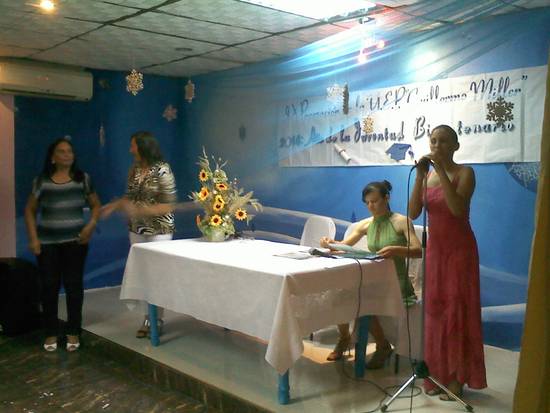
- I don't know who it was. I don't know if the communal councils joined the people who have left upset from the community. I don't know if it was Mayor Omar Prieto, I don't know, but this was a test that we had to face and the truth always comes out.
On Friday, April 1st of that year, 2011, Leonel's wife, Yaneth, told the newspaper "Versión Final" that Mayor Omar Prieto had promised to exterminate what he called a "sect", while she herself denounced that political interests wanted to keep their facilities.
The case of "El Patriarca", as they dubbed him from the police office, fell into the hands of the 48th prosecutor's office of the Public Ministry, headed by Fernando Lossada. After the 45 days required by law to find evidence to incriminate the accused, the six crimes were dismissed, as well as subsequent allegations of rape and attempted murder against a woman who died in 2002 in a road accident. Although all these cases were in different times, some well organized entity managed to gather all the information, including the alleged homosexuality for which he was expelled in 1985. Leonel still insists on not knowing who is behind all the accusations.
On the 45th day, the charges on Leonel, Yuvani and their driver were withdrawn for all six crimes. There was no evidence of cruel treatment, rape or reduction to slavery. After the hearing and with their reputations cleaned in front of the national authority, the prophet and his companions were nevertheless returned to the police jail.
The commune grew since 2011. Now there are 63 adults and 17 children who live among its branches. In the entrance hall there is a set of white leather furniture with a hanging glass lamp and a glass table, from which you can see the polished beige porcelain tiles of the floor. At both sides, rooms occupied by married couples, some of them with cribs, disposable diapers and baby clothes. There is also a girls' room with eight beds all covered with pink quilts and surrounded by detailed decorations (butterflies, lamps, pictures). Leonel himself is in charge of the design. In the dining room there is a table with eight seats and on one side one of the six kitchens: marble cladding with carved wooden cabinets and chromed handles. There is also another kitchen with three tables, all with eight or more places.
For Leonel, "el Patriarca" is not a pejorative description, although he knows that those who call him that is because they have read the newspaper. However, he believes that the police were right, because he is the leader and father of the whole organization.
-We live in community, we formed a commune. In short, we are communists. He says this as he leaves that first structure, his old house, and move to another one with floors of caicos (ceramics) and beach armchairs.
He shows everything, without grandiloquence. He arrives in the meeting room where there is any number of ornaments, another kitchen, another glass table, another living room and a corner with several portraits. Adam on one side, Jesus on the other. From top to bottom, important figures of the Adventist temple. In the middle, in the biggest picture, Leonel. Just as some of the residents cook and do all the house chores, one of them painted the picture.
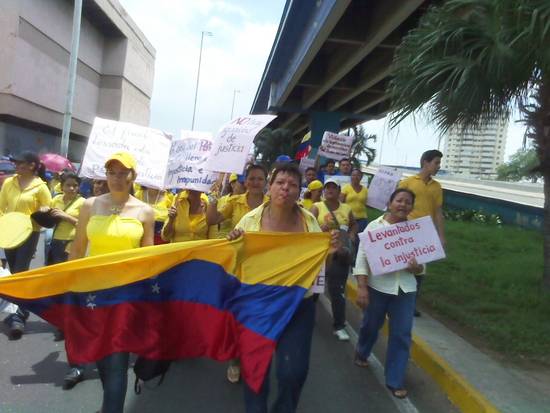
In another wing of the structure, the rooms. There are two separate rooms with individual wooden beds, side by side. The blue of one and the pink of the other indicate that the occupants are divided by sex. Everything carefully placed: bedside table, lamp, picture, window. Then, bedside table, lamp, picture, window. There are also fans and air conditioning. From there you can see that a bridge of sorts connects the first floor of one wing with the first floor of another. There are more rooms, libraries, computer rooms, playgrounds, meeting rooms.
Leonel has his office and he makes the rules. He walks across the cement roads and forbids stepping on the grass. He says hello to a bricklayer who makes a new room and notes that he is not being paid. He has a roof, food, education, entertainment and he only has to do what he knows how to do. He arrives at the dance therapy area and remembers that down there is deposited what comes out of the 35 bathrooms of the structure, because in the neighborhood there is not sewage network. He tells it while pointing to the pool, where one of the residents teaches swimming on Sundays and everyone, everybody, must attend the lessons. He also points out, proudly, that he has six power plants, bought during the crisis, and that he no longer depends on the State in that aspect. He also shows, in a more remote area, the construction of the visiting room and a small chicken coop. His plan is to produce their own food because he must buy sacks of vegetables and other food by bulks every day. Everything is planned in the small republic ruled by "El Patriarca".
Anabel has been living with her husband and three children in Habirú since 2011. For many years, she used to listen to Leonel's ideas, before his definitive expulsion, and shared his thoughts. Young and impetuous, the brunette went to study in Canada and returned to Venezuela with a law degree and married to a Salvadoran. When she arrived in 2010, she stayed just a few months. She didn't like the strictness of the rules. It's a different lifestyle.
There is a time for getting up and a time for going to bed. What should and shouldn't be done is written, so she gave up the idea and returned home.
- But outside I realized that I felt better here and I came back in 2011. I am the lawyer of the cooperative and Habirú, "she declares proudly, while showing a packet of "arepanes", a sort of integral pita bread that revolutionized the bakeries and the cooperative's funds.
The year she returned, her first case was the battle between a man and the State. - Leonel's trial ended in November 2014.
The day they dismissed their crimes, however, they returned him to jail. The same prosecutor, Lossada, had charged them with a new crime: tax fraud. As with Al Capone, they turned the case around to accuse him of allegedly evaded tax matters. Leonel became the first Zulian citizen to remain detained in a preventive detention center for more than four months for not having declared income taxes.
Anabel explained that this is usually a very cumbersome administrative procedure because it is the tax entity (Seniat) that must initiate the investigation and then forward it to the Public Prosecutor's Office. If it is proved, an administrative penalty is applied. In this case, it was preventive detention.
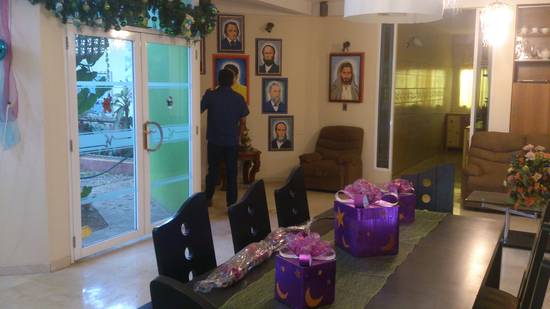
- But there is another detail: because Habirú is a cooperative, they only have to declare taxes, not pay them.
The anomalies spread. Although the crime was charged against Leonel, the prosecutor requested the freezing of all the cooperative's assets. It would have been acceptable if the investigation had fallen on such an organization and not on a natural person. After six months and some procedural delays, Leonel González and Yuvani (the driver was released after 45 days) returned to Habirú under presentation regime.
The case was dismissed.
- Yes, they made fun of it in the press, but it happened on January 6, 2012 what I had predicted: the beginning of the end time. I am a prophet -, Leonel never loses his smile or the self-confidence.
To him, it was all a test. Today he is collecting evidence to denounce prosecutor Fernando Lossada. He already pointed out the case against the newspaper Panorama at the National College of Journalists and is still evaluating whether or not to file a formal lawsuit against the newspaper with the Public Prosecutor's Office. After the arrest and the accusations, the commune grew even more and its facilities were improved, there are new members and he seeks, every day, for the members to multiply.
According to him, he has never rejected anyone. Raúl Díaz Granados, one of his accusers, lived in Habirú for several years and one day, tired of the rules, he left. His wife, the sister of Leonel's wife, didn't want to leave the community and that upset him. Like him, others have left.
One of the main rules of Habirú is that whoever leaves, cannot take anything with them, but the whole building is in the land of Leonel's parents.
It is 5:00 in the afternoon and from the backyard you can hear the hubbub. There are at least nine children in school uniforms playing in a small park. There is no rule that controls the sand on white t-shirts.
- Soon you will hear about us, because we want this to grow, for thousands of people to live like this, with us - Leonel's project demonstrates that the mistake of communism is to isolate itself from religion.
"El Patriarca", who has always been persecuted by sexuality in all its expressions, has no partner since Yaneth died of cancer. He refuses to replace her.
- She's going to resurrect. I'm waiting for her.
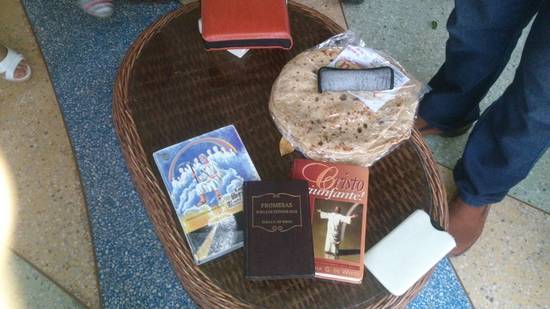
When Vice President Delcy Rodríguez turned to a group of Mexican friends and partners to lessen the new electricity emergency in Venezuela, she laid the foundation stone of a shortcut through which Chavismo and its commercial allies have dodged the sanctions imposed by Washington on PDVSA’s exports of crude oil. Since then, with Alex Saab, Joaquín Leal and Alessandro Bazzoni as key figures, the circuit has spread to some thirty countries to trade other Venezuelan commodities. This is part of the revelations of this joint investigative series between the newspaper El País and Armando.info, developed from a leak of thousands of documents.
Leaked documents on Libre Abordo and the rest of the shady network that Joaquín Leal managed from Mexico, with tentacles reaching 30 countries, ―aimed to trade PDVSA crude oil and other raw materials that the Caracas regime needed to place in international markets in spite of the sanctions― show that the businessman claimed to have the approval of the Mexican government and supplies from Segalmex, an official entity. Beyond this smoking gun, there is evidence that Leal had privileged access to the vice foreign minister for Latin America and the Caribbean, Maximiliano Reyes.
The business structure that Alex Saab had registered in Turkey—revealed in 2018 in an article by Armando.info—was merely a false start for his plans to export Venezuelan coal. Almost simultaneously, the Colombian merchant made contact with his Mexican counterpart, Joaquín Leal, to plot a network that would not only market crude oil from Venezuelan state oil company PDVSA, as part of a maneuver to bypass the sanctions imposed by Washington, but would also take charge of a scheme to export coal from the mines of Zulia, in western Venezuela. The dirty play allowed that thousands of tons, valued in millions of dollars, ended up in ports in Mexico and Central America.
As part of their business network based in Mexico, with one foot in Dubai, the two traders devised a way to replace the operation of the large international credit card franchises if they were to abandon the Venezuelan market because of Washington’s sanctions. The developed electronic payment system, “Paquete Alcance,” aimed to get hundreds of millions of dollars in remittances sent by expatriates and use them to finance purchases at CLAP stores.
Scions of different lineages of tycoons in Venezuela, Francisco D’Agostino and Eduardo Cisneros are non-blood relatives. They were also partners for a short time in Elemento Oil & Gas Ltd, a Malta-based company, over which the young Cisneros eventually took full ownership. Elemento was a protagonist in the secret network of Venezuelan crude oil marketing that Joaquín Leal activated from Mexico. However, when it came to imposing sanctions, Washington penalized D’Agostino only… Why?
Through a company registered in Mexico – Consorcio Panamericano de Exportación – with no known trajectory or experience, Joaquín Leal made a daring proposal to the Venezuelan Guyana Corporation to “reactivate” the aluminum industry, paralyzed after March 2019 blackout. The business proposed to pay the power supply of state-owned companies in exchange for payment-in-kind with the metal.